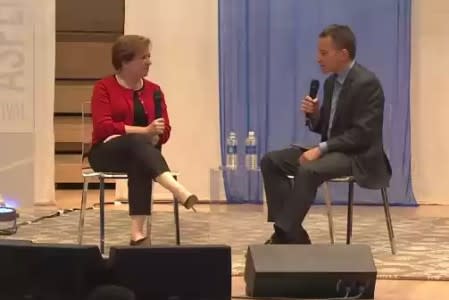Justice Elena Kagan talks about privacy cases, hunting with Scalia
The National Constitution Center’s Jeffrey Rosen talks with Supreme Court Justice Elena Kagan about privacy rules, recent Court cases, and what it’s like to go hunting with Justice Antonin Scalia.
Justice Kagan and Jeffrey Rosen
Rosen, the Center’s president and CEO, moderated several events at the Aspen Institute’s Aspen Ideas Festival this week.
Justice Kagan spoke with Rosen about the Court on Saturday as part of the festival’s guest speaker series.
Rosen asked how the Justices interact during a busy term, like the 2012-13 term that contained more than few tough decisions.
“This is a very collegial court and in today’s court there are true and genuine friendships,” Kagan said.
For example, Kagan talked about going big-name hunting with Scalia last year in Wyoming, where Kagan confirmed she shot a deer during the hunt.
Kagan said she grew up in Manhattan and she made a vow to go hunting during her confirmation proceeding, and she sought out Scalia’s hunting help after she became a Justice.
Kagan also said that after she was confirmed she had doubts about how much talking there was in the court building aside from the official conferences.
“What I expected was there’s not a lot of out of conference talking, schmoozing,” Kagan said. “But there’s a lot of talk about the things friends talk about.”
Kagan also talked about the consensus building ability of Chief Justice John Roberts and her privacy concurrence in Florida v. Jardines, a case about a police dog in Florida used to sniff out drugs from a person’s front porch.
“This was a very old school kind of case,” she said. “But at the same time it’s quite connected to a lot of newer Fourth Amendment issues,” she said.
Kagan called privacy cases “a growth industry” for the Court in coming years.
Rosen also pointed out Kagan’s role in asking a key question that was cited in Justice Anthony Kennedy’s opinion that struck down the Defense of Marriage Act.
“The question was meant to do,” Kagan said, was to point out what was “animating” the Congress that passed DOMA back in the 1990s.
To see the full interview, including Kagan’s thoughts about privacy related to property issues, and her viewpoint on some other difficult decisions the Court faced in the past few months, watch the video below:


